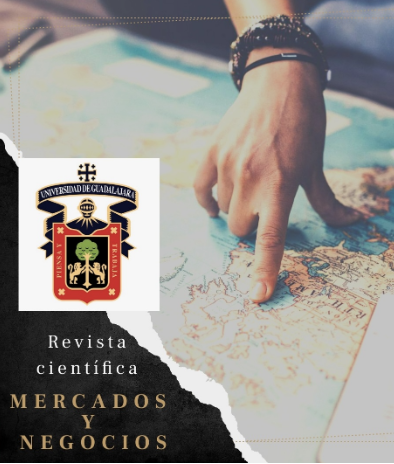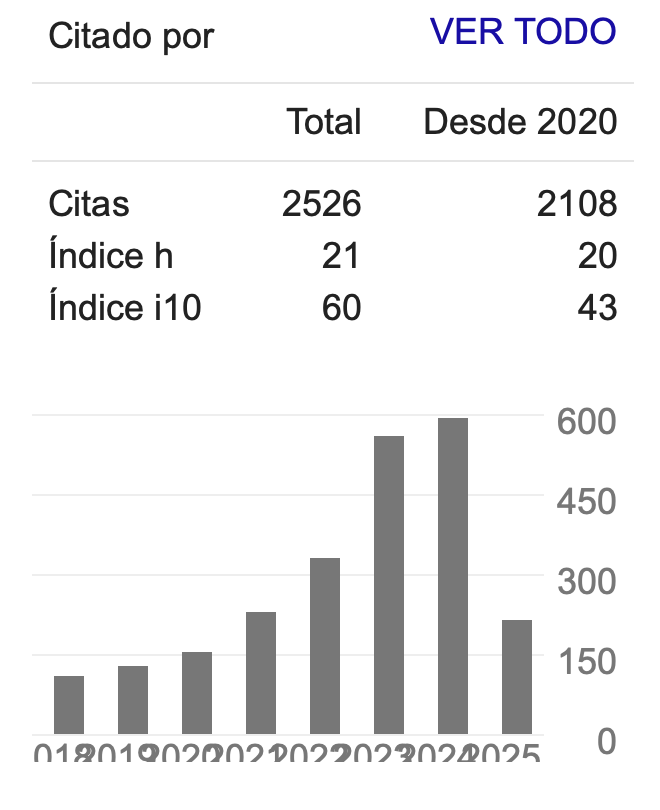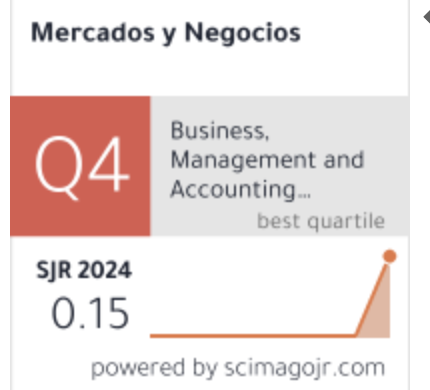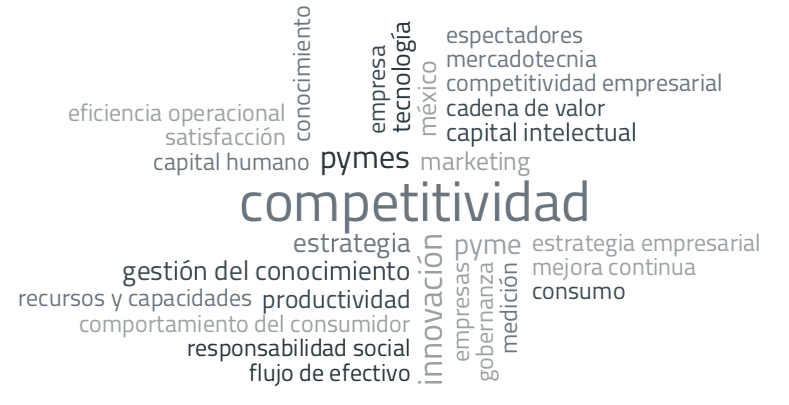Collective Intelligence synergizing into individual and business Resilience
DOI:
https://doi.org/10.32870/myn.vi49.7700Palabras clave:
Collective Intelligence, Integrity, Resilience, PowerResumen
The presence of Collective Intelligence engenders the integrity of the person and the group in the business and thus, synergistically strengthens the collective resilience, understood as the individual and the company’s resilience. Synergistically as shown, is the habit of creative interactively cooperation, so that each element or party increases the effect of the otherCitas
Aguilar, C. (1999). Asymmetries of comparison. Psychonomic Bulletin & Review, 6(2), 328–337. https://doi.org/10.3758/BF03212338
Al-Omoush, K., Ribeiro-Navarrete, S., Lassala, C., & Skare, M. (2022). Networking and knowledge creation: Social capital and collaborative innovation in responding to the COVID-19 crisis. Journal of Innovation & Knowledge, 7(2), 100181.
Bardi, A., & Schwartz, S. (2003). Values and behavior: Strength and structure of relations. Personality and social psychology bulletin, 29(10), 1207-1220.
Brunnermeier, M. (2021). The resilient Society. Endeavor Literary Press
Cambridge-Dictionary. (2023). Cambridge Dictonary. Cambridge Dictionary:
Chikersal, P., Tomprou, M., Kim, Y., Woolley, A., & Dabbish, L. (2017, February). Deep structures of collaboration: Physiological correlates of collective intelligence and group satisfaction. In Proceedings of the 2017 ACM conference on computer supported cooperative work and social computing (pp. 873-888). https://doi.org/10.1145/2998181.2998250
Choi, Y., Han, S., & Lee, S. (2014). Audit committees, corporate governance, and shareholder wealth: Evidence from Korea. Journal of Accounting and Public Policy, 33(5), 470-489.
Dalio, R. (2023). Work principle of the day. Linkedin Link: https://www.linkedin.com/posts/raydalio_an-idea-meritocracyie-a-system-that-brings-activity-6472122783601029120-jV0Y#:~:text=Close%20Menu-,An%20idea%20meritocracy%E2%80%94i.e.%2C%20a%20system%20that%20brings%20together%20smart,any%20other%20decision%2Dmak
Dictionary. (2023). Synergistically. Dictionary.com
Gibson, J. (1987). The ecological approach to visual perception. Psychology press
Gilan, D. (2021). Resilienz – die Kunst der Widerstandskraft. Freiburg im Breisgau: Verlag Herder GmbH.
González, T. (2021). The Al-Invest Contribution to the Resilience of the Chemical Company: Development Cooperation. Journal of International Cooperation and Development, 4(2), 1.
Grasso, A., & Convertino, G. (2012). Collective Intelligence in Organizations: Tools and Studies: Introduction. Computer Supported Cooperative Work (CSCW), 21, 357-369.
Heidegger, M. (1993). Sein und Zeit. Tübingen: Max Niemeyer Verlag.
Kerzner, H. (2002). Project Management. Ohio: Administration Balwin Wallace College.
Kravitz, E. (2000). Serotonin and aggression: insights gained from a lobster model system and speculations on the role of amine neurons in a complex behavior. Journal of Comparative Physiology A, 186, 221-238.
Küng, H. (1995). Das Christentum- Wesen und Geschichte Piper- München, München: Piper.
Linnenluecke, M. (2017). Resilience in business and management research: A review of influential publications and a research agenda. International Journal of Management Reviews, 19(1), 4-30.
Lyons, S. (2008). Corporate Defence: Risk Management, Business Resilience and Beyond. The Business Continuity Journal, 2(4).
Merriam Webster. (2023). Dictionary. Merriam Webster. Link: https://www.merriam-webster.com/dictionary/
Mignenan, V. (2021). Collective intelligence and entrepreneurial resilience in the context of covid-19. International Business Research, 14(9), 1-21.
Nietzsche, F. (1998). Twilight of the idols or, How to philosophize with the hammer. Trans. Richard Polt. Indianapolis: Hackett.
Osterwalder. (29. November 2022). Manager Magazin. Von Manager Magazin: https://www.manager-magazin.de/harvard/strategie/strategieexperte-alexander-osterwalder-ueber-unternehmenskultur-und-innovation-a-ab636477-ec82-43f7-8c68-9b46fa691f97 abgerufen
Peterson, J. (2017a). Maps of meaning. Toronto: Toronto University.
Peterson, J. (2017b). Personality. Toronto: Toronto University.
Peterson, J. (2013). Three forms of meaning and the management of complexity. In D. Markman, T. Proulx, & J. Lindberg (Eds.), The psychology of meaning (pp. 17–48). American Psychological Association. https://doi.org/10.1037/14040-002
PMI. (2013). PMBOK Guide. Project Management Institute.
Roderick, R. (1991). 206 Nietzsche The will to power. Roderick. Link: http://rickroderick.org/206-nietzsche-the-will-to-power-1991/
Russels, B. (2013). George Berkely, Philosophie des Abendlandes. München: Piper.
Schwartz, S. (2003). A proposal for measuring value orientations across nations. Questionnaire package of the european social survey, 259(290), 261.
Schwartz, S. (2016). Values. In H. L. Miller (Ed.), Values: The SAGE Encyclopedia of Theory in Psychology (pp. pp.950-951). SAGE Publications, Inc.
Seibel, H. (1973). Folgen des Leistungskonflikts in der bürgerlichen Gesellschaft.Das Argument. Das Argument, 123-143.
Sherman, S. (1999). Commentary on “Economic Preferences or Attitude Expressions? An Analysis of Dollar Responses to Public Issues” by Kahneman, Ritov and Schkade. (I. U. Psychology, Ed.) Journal of Risk and Uncertainty, 237-239.
Silva, J. (1998, May 17th). Valores / lo que vale: ¿Dónde están los valores?, Periódico Reforma .
Soderlund, J. (2011). Pluralism in Project Management: Navigating the Crossroads of Specialization and Fragmentation. International Journal of Management reviews, (13), 153-176.
Steggemann, M. (2011). Impact of The Organizational Culture on the Generation of Economic Value https://doi.org/
13140/RG.2.2.19038.84805
Steggemann, M. (2015). Complementarity between universalism and particularism in the filial of the German transnational located in Mexico. Mexico: Universidad la Salle. https://doi.org/10.13140/RG.2.1.3687.8564
Svejvig, P. & Andersen, P. (2014). Rethinking project management: A structured literature review with a critical look at the brave new world. International Journal of Project Management https://doi.org/10.1016/j.ijproman.2014.06.004
Wathne, K., & Heide, J. (2000). Opportunism in interfirm relationships: Forms, outcomes, and solutions. Journal of marketing, 64(4), 36-51.
Wong, W., Sinnandavar, C., & Soh, K. (2021). The relationship between supply environment, supply chain integration and operational performance: The role of business process in curbing opportunistic behaviour. International Journal of Production Economics, 232, 107966.
Descargas
Publicado
Cómo citar
Número
Sección
Licencia
Derechos de autor 2023 Michael Steggemann

Esta obra está bajo una licencia internacional Creative Commons Atribución-NoComercial 4.0.
Mercados y Negocios por Departamento Mercadotecnia y Negocios Internacionales. Universidad de Guadalajara se distribuye bajo una Licencia Creative Commons Atribución-NoComercial 4.0 Internacional.
Basada en una obra en http://revistascientificas.udg.mx/index.php/MYN/.
Los autores conservan los derechos de autor.








